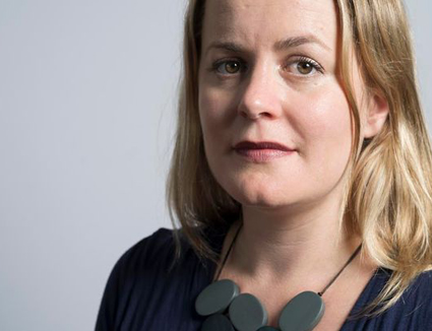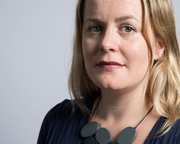Narrative Freedoms: Four Fragments
By Angela Woods

In 2018, we commissioned 51 authors from 25 countries to write essays exploring ideas about freedom for The Freedom Papers, a publication produced in partnership with Gutter Magazine. Read on for Angela Woods' essay, and visit guttermag.co.uk to purchase a copy of The Freedom Papers.
Our mistake was to think that everyone must be like us
– Brian Schiff
My grandmother sparkled with the stories of her past. Perfected through countless performances, her short narratives crystallised into precise recitals: words and cadences, flourishes and asides unchanged whatever the occasion and whoever the audience. Thus fixed, as moments and as assemblage, they became proof of her enduring capacity to amuse and animate; synonymous with, inextricable from, her striking sense of self.
My mother, by contrast, hauled in her narrative anchors and determined instead to drift wherever the currents took her. It is not that she disowns her past; she refuses to dwell on or in it, resists summoning it to the surface. Her stories, too, sparkle, but they are enlivened by an enchantment with the present and its possibilities. Her declared commitment: to a self of ceaseless change.
It is more than a question of the content of the tales. What structures of narrativity are we born in to, do we grow up in, do we unwittingly cultivate, react to and reject? Are we free to choose?
*
Analytic philosophers are peculiarly gifted at causing the kind of rumpus that ripples out across debates and disciplines they otherwise seldom trouble to engage. Galen Strawson especially so. In 2004 he set out a challenge to two modern dogmas, beliefs about what it is to be human that are defended as vigorously by marketing executives and psychotherapists as by novelists and theologians. The first is ‘that human beings typically see or live or experience their lives as a narrative or story of some sort’; the second ‘that experiencing or conceiving one’s life as a narrative is a good thing; a richly Narrative outlook is essential to a well lived life, to true or full personhood.’ Both claims, he argues, are false: ‘It’s just not true that there is only one good way for human beings to experience their being in time. There are deeply non-Narrative people and there are good ways to live that are deeply non-Narrative.’
‘Against Narrativity’ is crisp in its polemic and crafty in its sidestepping. Strawson presents narrativity as a psychological propensity for narrative, a tendency for particular types of meaning-making that goes above and beyond the cognitive capacity to plot events across time. Raising the ire of many a narratologist he declines further definition of his key terms, except to dismiss as trivial the narrativity involved in making a cup of coffee. The target, it seems, of Strawson’s critique is the life story, the developmental arc of the Bildungsroman, the culturally sanctioned scaffolding through which what we typically regard as a self acquires and discloses its interiority and autonomy, its solidity and sociality.
‘I have measured out my life with coffee spoons’ murmured J Alfred Prufrock. And maybe I have his love song to blame for my suspicion of this too-easy dichotomy. Perhaps because Strawson offers himself as the exemplary ‘episodic’, deeply non-narrative and happily so, most critics seem driven by the desire to catch him out, to show that he is – he must be – more narrative than he cares to acknowledge. I am more curious to know when a narrative about coffee can and does define a life.
Analyses I undertake professionally illuminate and intensify tensions in the training that began before I was born: the desire to harness and to flee the performative power of particular narrative practices. I play my own fort da game with the fiction of Alice Munro and Elizabeth Strout, alternately terrified and reassured by those exquisitely rendered moments in which life hinges on what is said, or not, in a kitchen, on an autumn afternoon.
*
A distinctively twenty-first century dynamic: the distribution of selves across social media, materialising across multiple platforms in bursts of 240 characters and images no longer worth 1000 words. The freedom of the fragment is a potential that exists alongside, might even be indivisible from, a propensity for narrativity that is fast becoming an injunction. If it is trivial to view making or drinking a cup of coffee as an exercise of our narrative capacities, what would Strawson say about then the less-than-a-second liking of one on Facebook? Shift the locus of narrativity from agents to algorithms, multiply by the millions, and we turn the trivial on its head: the right formula can transform a scattering of your innocuous thumbs ups into a devastatingly powerful story about who you are and how you exercise your democratic rights. Storytelling in the Cambridge Analytica era.
*
To have a story is radical – to articulate, to shape, to share a narrative is to lay claim to freedom, to exercise agency. Recognising this, we increasingly call for stories to be honoured, circulating and celebrating in particular confessional narratives which illustrate our moral, psychological, intellectual growth. This worries me. I worry first about who this ‘we’ includes and who falls out of its embrace. Risking the first-person plural, I worry that in confining ourselves not just to particular scripts but to ever-narrower narrative structures we shut down possibilities for who we might be and become. How capable are we, as individuals and collectives, of recognising, much less valuing, the incomplete, the ambiguous and uncomfortable, the nonsensical, the unhealable, or anything which fails formally to cohere into all but the most digestible of narratives forms? Our culturally insatiable thirst for stories in the first person – stories of triumph over adversity, of recovery, of the journey to enlightenment – keeps the ‘I’ obsessively in focus while at the same time narrowing the field of its possibilities.
If you are reading The Freedom Papers, you are more than likely free to encounter a huge variety of narrative forms, in person, online, in literature. Seek them out.
Copyright © 2018, Angela Woods. All rights reserved.
Supported by the Scottish Government’s Edinburgh Festivals Expo Fund through Creative Scotland.
Look, Listen & Read
- 2026 Festival:
- 15-30 August
Latest News
 Major new partnership with Celtic Connections
Major new partnership with Celtic Connections




